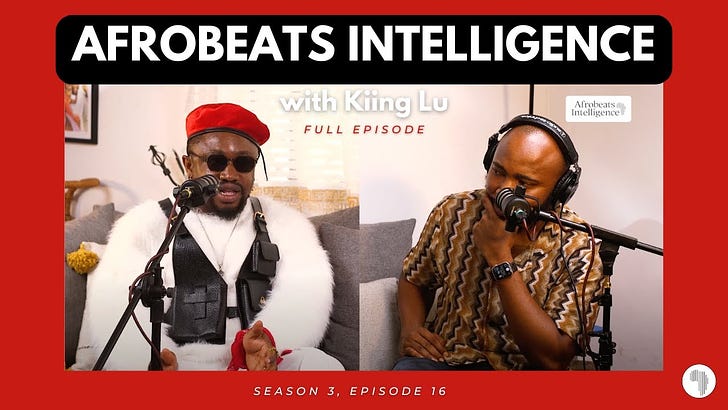Kiing Lu: How to Sell Great Records
The Relentless Rise of Kiing Lu: How a Militant Mindset Built Afrobeats' Hidden Empire
When Lucas Emeodi, aka Kiing Lu, walks into a room, you don’t just feel his presence—you feel his purpose. It’s in the way he speaks about his “militant mindset,” a philosophy carved from the rugged streets of Jos and sharpened through the unforgiving trenches of Nigeria’s music industry. On Afrobeats Intelligence, Season 3, Episode 15, Joey Akan unpacks the blueprint behind one of the industry's most resilient culture entrepreneurs. This isn’t just another tale of hustle and grind—it’s a study in how to move with strategy, precision, and unwavering belief.
Kiing Lu’s story isn’t the cliché of stumbling into success. It’s the saga of a man who chose his path, even when it meant defying family expectations and enduring exile from his father’s home. He cut his teeth as a rapper and producer in Jos, went underground in Ghana for seven years to learn the business, and returned to Nigeria with an arsenal of hard-earned knowledge. “It wasn’t about the money,” Lu reflects. “It was about learning. About becoming.”
In a world where the music industry chews up dreams and spits out cynics, Kiing Lu remains an anomaly. His discovery of TG Omori, now one of the continent’s most sought-after video directors, exemplifies his eye for talent. Omori was just a kid with a vision and no portfolio. Lu gave him his first shot—and the rest is music video history.
At Universal Music Nigeria, Lu wasn’t content with titles. As Head of Promotions and an A&R, he was the architect of campaigns for some of the biggest artists in the game. But true to his militant philosophy, he wasn’t just clocking in for a paycheck. “I was building,” he explains. “I was learning how a global machine works so I could build my own.” And build he did, with Speedplug Promotions and Captive Music—home to some of Afrobeats’ brightest stars like Tems, Tiwa Savage, and OdumoduBlvck.
The core of Lu’s militant mindset isn’t about aggression—it’s about intention. “Impact first, money follows,” he says with the conviction of a man who has seen both the bottom and the top. He’s not chasing awards or validation; he’s building something bigger. His “Militant Camp” isn’t just an event—it’s a community. A space where Drille’s fusion of hip-hop and Afrobeat finds its heartbeat, where the grind is revered, and the dreamers are battle-tested.
But for all his success, Lu isn’t immune to the music industry’s darker side. “The feeling of being underappreciated is a mindset,” he says, dismissing the need for applause. “Buy your own flowers.” It’s a mantra that speaks to the heart of his brand—self-sufficiency, resilience, and relentless self-belief.
Yet beneath the armor of Kiing Lu lies Lucas Emeodi, the man who is husband and father, the man who once chose dreams over comfort and won. “When I’m home, I’m Lucas. When I’m out, I’m Kiing Lu,” he explains, illustrating the balance between ambition and authenticity. It’s a duality that defines the man, the brand, and the movement.
In the end, this episode of Afrobeats Intelligence is more than an interview—it’s a manifesto. A call to every music executive, producer, and creative grinding in the shadows: Embrace the militant mindset. Don’t wait for permission. Build the bridges. Break the rules. And when the world doesn’t hand you the flowers? Plant your own garden and watch them grow.




